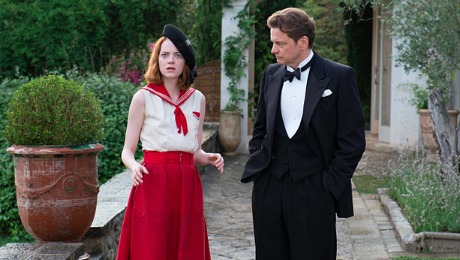There are four categories of Woody Allen movies — classics (Manhattan, Annie Hall, Crimes and Misdemeanors, The Purple Rose of Cairo, Hannah and Her Sisters), very goods (Husbands and Wives, Match Point, Stardust Memories, Mighty Aphrodite, Bullets Over Broadway, Vicky Cristina Barcelona), fairly goods (Everyone Says I Love You, Deconstructing Harry, Sweet and Lowdown, September) and duds or semi-duds (Scoop, Alice, Manhattan Murder Mystery, Hollywood Ending, Melinda and Melinda, You Will Meet A Tall Dark Stranger, Curse of the Jade Scorpion). His latest, Magic in the Moonlight, is mostly a third-category effort but in the general realm that equals a solid B grade. We all know how this goes. We’re all accustomed to our annual Woody fix, and as long as it’s not a burn (which this isn’t) there’s nothing to complain about. This one actually has a notable quality or current that kicks it up a notch and in fact makes it entirely unique in the Woody canon.

Emma Stone, Colin Firth in Woody Allen’s Magic in the Moonlight.
To the less perceptive Magic in the Moonlight presents itself as a typically mid-tempo ensemble piece, very dry and mild-mannered but often amusing. Set in various Cote d’Azur locations in 1928, it’s about Stanley (Colin Firth), a witty, curmudgeon-like magician who’s been asked to debunk Sophie (Emma Stone), a professional mystic who may be exploiting a rich Pennsylvania matron (Jackie Weaver), and who is also being aggressively wooed by the matron’s son (Hamish Linklater).
It’s obvious from the get-go that Firth will gradually fall prey to Stone’s charms, and I don’t just mean her big beautiful eyes but also her spiritual aura, and that she’ll eventually reciprocate in the end.
But the romantic issues are clearly secondary in Magic in the Moonlight. I would even call them incidental in a sense. For it’s really a film about Stanley’s mind and soul — a spiritually-directed thing about mystical or after-life issues. In short, Woody is pushing 80 and….well, he’s starting to wonder a bit. He’s not falling for any religious hooey a la Bob Dylan in the ’70s, but Magic is still the first Woody flick that includes a sincerely written and performed scene in which the lead tries to pray, or at least have some sort of open-hearted conversation with an Overseeing Presence who has an interest in the condition of humans on that insignificant speck of terra firma known as Earth.
That’s quite startling if you’ve been following Woody since the Ford administration.
Allen’s proximity to…well, not death but a stage of life in which death tends to tap people on the shoulder more often than not has led him to make the first spiritual-quest film of his life. It’s certainly not a typical romantic chess-play movie, I can tell you that.
Having had a brush with mystical revelation myself in my 20s (via a mixture of LSD and the Bhagavad Gita), I had a very positive response to 99% of Magic in the Moonlight, or more precisely to everything in the film except for the last eight to ten seconds. I won’t explain my problem for another couple of weeks, after everyone’s had a chance to see it.
What matters and is in fact moving is that Firth’s Stanley has come to accept or at least value the comfort of magic or mysticism or even the theatrical claptrap that Stone’s Sophie and her co-conspirators are selling. Firth has opened his heart to Stone and said to himself, “As crazy as this sounds, I’m touched by Sophie’s vibe, by her spirit…the thought or presence of unknown or mystical elements in the world lifts my own spirit, even as I intellectually realize it’s almost certainly poppycock.”
The spiritual realization is what matters to him and to us. Magic in the Moonlight is not about romantic flirting and coupling — it’s about spiritual flirting and coupling, at least in a temporary sense. Woody is suggesting that rational, intellectual, practical and methodical approaches to life are sometimes not enough, and that sometimes we need a little craziness, a little faith, a little irrational love in our hearts to make it all seem worth it or come together on some level.
